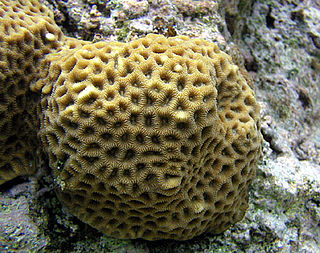
Brain coral is a common name given to various corals in the families Mussidae and Merulinidae, so called due to their generally spheroid shape and grooved surface which resembles a brain. Each head of coral is formed by a colony of genetically identical polyps which secrete a hard skeleton of calcium carbonate; this makes them important coral reef builders like other stony corals in the order Scleractinia. Brain corals are found in shallow warm water coral reefs in all the world's oceans. They are part of the phylum Cnidaria, in a class called Anthozoa or "flower animals". The lifespan of the largest brain corals is 900 years. Colonies can grow as large as 1.8 m (6 ft) or more in height.
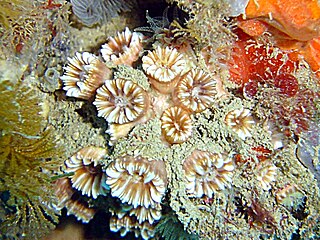
The Caryophylliidae are a family of stony corals found from the tropics to temperate seas, and from shallow to very deep water.

Acanthastrea is a genus of large polyp stony corals in the family Lobophylliidae. The colonies are massive and usually flat. The corallites are either circular or angular in shape. The septa are thick near the wall of the corallite, becoming thin near the columella, and have tall teeth. The polyps are extended only at night.

Siderastreidae is a family of reef building stony corals. Members of the family include symbiotic algae called Zooxanthellae in their tissues which help provide their energy requirements.

Astrocoeniidae is a family of stony corals. The family is distributed across the tropical and subtropical oceans worldwide.

Dendrophylliidae is a family of stony corals. Most members are azooxanthellate and thus have to capture food with their tentacles instead of relying on photosynthesis to produce their food. The World Register of Marine Species includes these genera in the family:

Balanophyllia is a genus of solitary corals in the order of stony corals.
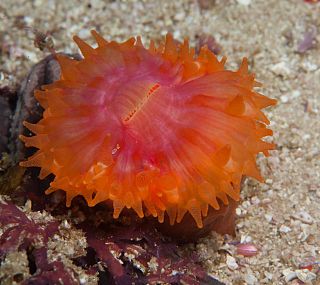
Caryophyllia is a genus of solitary corals in the family Caryophylliidae. Members of this genus are azooxanthellate and are found in the North Atlantic Ocean and the Mediterranean Sea at depths down to 2,670 metres (8,760 ft).

Meandrina is a genus of colonial stony coral in the family Meandrinidae. Corals in this genus form massive hemispherical heads or have large flat plates and can grow to a metre (yard) across. Sometimes it is referred to as brain coral.

Leptopsammia is a genus of stony cup corals in the family Dendrophylliidae. Members of this genus are found at depths down to about 900 metres (3,000 ft). They are azooxanthellate, meaning that they do not contain symbiotic photosynthetic algae as do many species of coral.
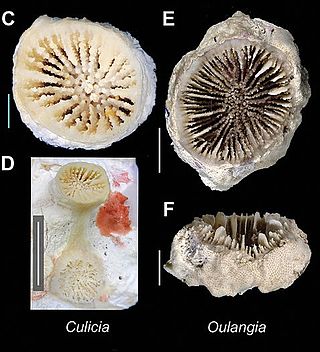
Rhizangiidae is a family of stony corals in the order Scleractinia. This family is closely related to Oculinidae. Members of this family are non-reef building corals and reproduce from stolons. The corallites are small and the septa are simple.

Merulinidae is a family of reef-building stony corals.
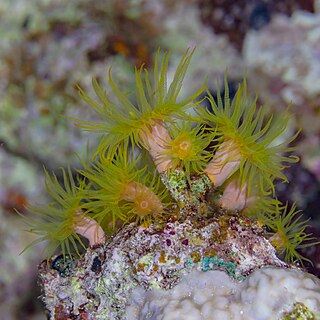
Cladopsammia is a genus of stony cup corals in the family Dendrophylliidae. Members of this genus are found at depths down to about 470 metres (1,540 ft). They are azooxanthellate corals, meaning that they do not contain symbiotic photosynthetic dinoflagellates as do many species of coral.

Dendrophyllia is a genus of stony cup corals in the family Dendrophylliidae. Members of this genus are found at depths down to about 900 metres (3,000 ft). They are azooxanthellate corals, meaning that they do not contain symbiotic photosynthetic dinoflagellates as do many species of coral.

Turbinoliidae is a family of reef building stony corals.

Leptastrea is a genus of massive reef building stony corals known primarily from the Indo-Pacific. Although previously assigned to Faviidae, Budd et al. (2012) assigned it to Scleractinia incertae sedis based on phylogenetic results demonstrating the polyphyly of Faviidae. Assigned to family Leptastreidae by Rowlett (2020).
Homophyllia is a genus of stony corals in the family Lobophylliidae.
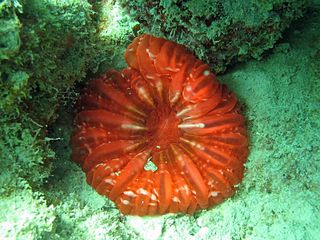
Cynarina is a genus of stony corals in the family Lobophylliidae.

Plesiastraea is a genus of corals. It is the only genus in the monotypic family Plesiastreidae.

Heterocyathus is a genus of coral of the family Caryophylliidae.



















